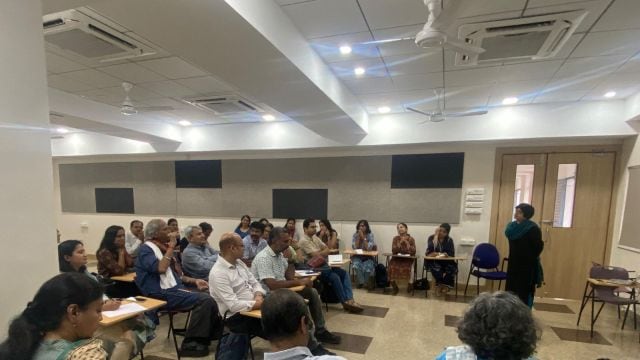Click here to join Express Pune WhatsApp channel and get a curated list of our stories
‘It is possible’: Gokhale Institute experts are charting a course for waste-free rivers
CSD is working on a strategy to address the problem of solid waste in Pune's waterbodies.
 One of CSD's proposals included the creation of a ‘Model Waste-free River Stretch’. (Express photo)
One of CSD's proposals included the creation of a ‘Model Waste-free River Stretch’. (Express photo)A number of people in Pune are worried about the future of the rivers. Among the many threats to the water is solid waste, from food, plastic, old furniture and expired medicines to construction debris, ritual offerings and dead animals.
“Only a fraction is present in the flowing river channel, with the majority of it remaining stagnant in the riverbed,” said Aditi Deodhar, Project Lead at Centre for Sustainable Development (CSD) Gokhale Institute of Politics and Economics (GIPE).
CSD is working on a strategy to address the problem of solid waste in Pune’s waterbodies.
On Wednesday, Deodhar shared observations from field research and proposed ideas to be implemented. The workshop for developing a comprehensive strategy for garbage-free Pune rivers was attended by experts who are engaged in mitigating the problem in different sectors, such as waste prevention, recycling and upcycling. Besides Deodhar, the CSD team comprised Gurudas Nulkar, Vaidehi Dandekar and Field Associates Ashwini Bhilare, Srihari Suthamully and Ameya Kulkarni.
One of CSD’s proposals included the creation of a ‘Model Waste-free River Stretch’. “Instead of spreading efforts and resources over a large geographic area i.e, Pune city, we could focus on a small section where impact is achieved and can be demonstrated. All individuals, NGOs and local government agencies could work together on this focus area. We could identify types of pollution and sources in this area, identify stakeholders and with all resources concentrated on this focus area, implement all waste management approaches for the identified stakeholders,” says Deodhar.
The expected outcome would be that the people of Pune will be able to see a stretch without any waste and have a visual example of what the river could be, especially in comparison with adjoining garbage-strewn stretches. “To yank citizens out of their slumber, it is necessary to create the visualization of what was and what could be if we tried. The model stretch creation will achieve this,” said Deodhar, adding that “it is possible” to have clean rivers. The Mutha river and the riverbed between Chhatrapati Shivaji Bridge and Dengale Bridge, which has several historic sites as well as a metro line offering a bird’s eye view, appears ideal for the plan.
The other idea is to get to the source of the solid waste issue. “A garbage bag floating in the river in Pune City could have been dumped from any of the ghats, any of the 22 bridges over the river, or carried in by any of the feeder streams. Since we cannot trace the origin of waste, we cannot get to the source of the issue. Everybody has the right to the river, but nobody has the responsibility towards it. This is the plight of each river and all the rivers in the country,” said Deodhar.
She also mentions one can nail the source of the solid waste issue by installing solid waste blockers in the river at multiple strategic locations. This would pinpoint the origin of the in-stream solid waste. Deodhar added that blockers before and after Mhatre Bridge, for instance, would ensure that the waste present in the river between them is dumped from the Mhatre Bridge, as there could be no other source. “This method would help us to create a detailed location-wise report of solid waste dumping in the Mutha River, assessment, analysis of causes, and suggestion of mitigation measures. We can pinpointing the culprits, the most polluting stream and the most polluting bridge from which waste is tossed into the river,” she said.
Click here to join Express Pune WhatsApp channel and get a curated list of our stories








